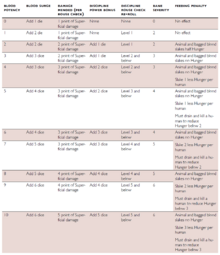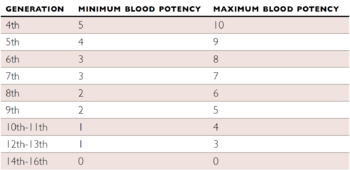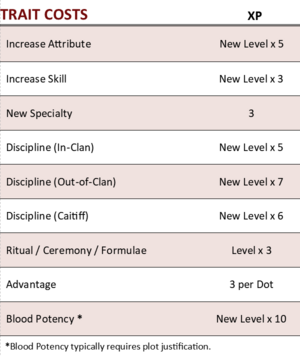Character Creation: Difference between revisions
Jump to navigation Jump to searchm (→SEA OF TIME) |
|||
| (One intermediate revision by the same user not shown) | |||
| Line 156: | Line 156: | ||
* '''FLEDGLINGS:''' Embraced yesterday | * '''FLEDGLINGS:''' Embraced yesterday | ||
** 14<sup>th</sup>, 15<sup>th</sup>, 16<sup>th</sup> Generation: '''Blood Potency 0''' | ** 14<sup>th</sup>, 15<sup>th</sup>, 16<sup>th</sup> Generation: '''Blood Potency 0''' | ||
** Each player takes 1-3 Thin-Blood Merits and an equal number of Thin-Blood Flaws. | ** Each player takes 1-3 [[Advantages#Thin-Blood|Thin-Blood Merits]] and an equal number of [[Advantages#Thin-Blood|Thin-Blood Flaws]]. | ||
[[File:AgeNeonate.png|50px|left]] | [[File:AgeNeonate.png|50px|left]] | ||
| Line 186: | Line 186: | ||
** Each player adds 4 points of Advantages | ** Each player adds 4 points of Advantages | ||
** Each player adds 2 points of Flaws | ** Each player adds 2 points of Flaws | ||
** Each player adds one Elder Merit | ** Each player adds one [[Advantages#Elder_and_Methuselah|Elder Merit]] | ||
** Each player adds one Elder Flaw | ** Each player adds one [[Advantages#Elder_and_Methuselah|Elder Flaw]] | ||
** Each player subtracts 2 Humanity | ** Each player subtracts 2 Humanity | ||
** Each player adds 3 Coterie dots | ** Each player adds 3 Coterie dots | ||
| Line 198: | Line 198: | ||
** 5<sup>th</sup> or 4<sup>th</sup> Generation: '''Blood Potency 6''' | ** 5<sup>th</sup> or 4<sup>th</sup> Generation: '''Blood Potency 6''' | ||
** Each player adds 6 points of Advantages | ** Each player adds 6 points of Advantages | ||
** Each player adds one Elder Merit | ** Each player adds one [[Advantages#Elder_and_Methuselah|Elder Merit]] | ||
** Each player adds one Elder Flaw | ** Each player adds one [[Advantages#Elder_and_Methuselah|Elder Flaw]] | ||
** Each player subtracts 3 Humanity | ** Each player subtracts 3 Humanity | ||
** Each player adds 3 Coterie dots | ** Each player adds 3 Coterie dots | ||
| Line 218: | Line 218: | ||
<br> | <br> | ||
The Storyteller awards each player experience points per session played, plus additional points at the end of each story. Players spend their points to improve their characters’ Traits or acquire specialties (p. 159) according to the Trait Cost chart in the Characters chapter on p. 151. Storytellers may insist that players have their characters take action in the course of the game to make any improvements, not just Merits, plausible. | |||
The Storyteller awards each player experience points per session played, plus additional points at the end of each story. Players spend their points to improve their characters’ Traits or acquire specialties (p. 159) according to the Trait Cost chart in the Characters chapter on p. 151. | |||
Storytellers may insist that players have their characters take action in the course of the game to make any improvements, not just Merits, plausible. | |||
Latest revision as of 17:26, 22 August 2023
CORE CONCEPT
What was your character’s name in life? What did they do? Where and when were they Embraced? What is their name now? Where are they now? Write your character’s name on the Relationship Map.
- Ambition: Think of Ambition as a long-term goal: an aspiration (if you still breathed), a life’s dream (if you still dreamed, or had life). An Ambition must be measurable in game terms or a concrete achievement in the world of the chronicle. At the end of a session in which the character has actively worked toward their Ambition, they recover one point of Aggravated Willpower damage.
- Desire: Desires are more immediate: short-term wishes for revenge, satisfaction, or satisfaction through revenge. Each session, a character can select a Desire or keep their unfulfilled Desire from the previous session. Once per session, when the character definitively acts to further or accomplish their Desire, they may immediately recover one point of Superficial Willpower damage.
CLAN & SIRE
Pick your clan. Write your character’s sire on the Relationship Map along with relevant sect SPCs.
ATTRIBUTES
- Take one Attribute at 4
- Take three Attributes at 3
- Take four Attributes at 2
- Take one Attribute at 1
- Health = Stamina + 3
(Fill in the remaining squares)
- Willpower = Composure + Resolve
(Fill in the remaining squares)
- Set your Humanity at 7.
(Fill in squares equal to your Humanity)
For more information on Health/Willpower/Humanity, see the Trackers page.
SKILLS
Pick one Skill distribution.
- Jack of All Trades: One Skill at 3, eight Skills at 2, ten Skills at 1
- Balanced: Three Skills at 3, five Skills at 2, seven Skills at 1
- Specialist: One Skill at 4, three Skills at 3, three Skills at 2, three Skills at 1
Add free specialties to Academics, Craft, Performance, and Science Skills that you may have.
Take one more free specialty in any Skill you have.
DISCIPLINES
- Choose two of your clan Disciplines. Put two dots in one Discipline, and one dot in the other.
- Note: Only at Level 1, Blood Sorcery nets one free Ritual, and Oblivion nets one free Ceremony. All future rituals and ceremonies must be purchased with XP.
- For Caitiff, choose any two Disciplines. Put two dots in one and one dot in the other.
- Thin-bloods have no intrinsic Disciplines, but may begin with a dot in Thin-Blood Alchemy if they take the "Thin-blood Alchemist" Merit. (V:tM, pg. 184)
PREDATOR TYPE
- Pick your Predator Type.
- Add one of the listed specialties.
- Add one dot to a listed Discipline.
- Apply any associated Advantages or Flaws.
ADVANTAGES
- Spend 7 points on Advantages
- Take 2 points of Flaws in addition to any gained from your Predator Type.
- Points can also be spent on Lore Sheets. Characters may only use one Lore Sheet at a time, but may also have a secondary "Bloodline" sheet. Sheets listed as "Descendant of..." may also count as Bloodlines, per Storyteller approval.
- In addition to the above, Thin-bloods must also take between one and three Thin-Blood Merits and the same number of Thin-Blood Flaws.
- Each player also gains 1 point for Coterie creation. Players may also contribute their characters' own Advantage points to the Coterie creation pool. See Coterie Type for additional purchasable packages.
CONVICTIONS & TOUCHSTONES
- Decide upon three Chronicle Tenets as a group. These apply to all player characters in a chronicle, even if the character doesn’t hold this belief personally. The Tenets comprise a kind of ethical ground floor, so that decisions carry a cost.
- State three Convictions for your character.
- Create an equal number of Touchstones, each connected to one Conviction, and add them to the Relationship Map. Your Touchstones must be living mortals. Express permission from your Storyteller is required for any Touchstones that may be an animal, object, place, ritual, or supernatural peer. (See: Ritae)
- A list of example Tenets and Convictions can be found here. Feel free to take any as inspiration, mixing and matching them with your own original ideas.
SEA OF TIME
How old are the vampires you portray? Vampires from different centuries, or even from different decades, may hold very different values and beliefs from fledglings Embraced a week ago. Your sire is one generation lower than you, but for balance, your fellow players should all be of the same generation.
A vampire’s generation does not necessarily indicate their age. Rather, their Embrace sets their generation. Only through the forbidden act of Diablerie — by consuming the Blood and very spirit of another vampire — can it be changed.
Even within a generation, the potency of the Blood varies. Blood Potency increases as a vampire ages. As a general rule, a vampire gains a dot of Blood Potency every 100 years while active. A vampire in torpor loses Blood Potency at the rate of one level per 50 years. The Blood Potency of a vampire can never fall below the minimum for their generation, nor be increased above the maximum. The full effects of your given Blood Potency can be found on page 216 of the Corebook.
Generation confers the following during Character Creation:
- FLEDGLINGS: Embraced yesterday
- 14th, 15th, 16th Generation: Blood Potency 0
- Each player takes 1-3 Thin-Blood Merits and an equal number of Thin-Blood Flaws.
- NEONATES: Embraced within the last 100 years
- 12th or 13th Generation: Blood Potency 1
- Spend 15 experience points at character creation
- ANCILLAE: Embraced within the last 250 years
- 10th or 11th Generation: Blood Potency 2
- Each player adds 2 points of Advantages
- Each player adds 2 points of Flaws
- Each player subtracts 1 Humanity
- Spend 35 experience at character creation
- YOUNG ELDERS Embraced within the last 500 years
- 9th or 8th Generation: Blood Potency 4
- Each player adds 4 points of Advantages
- Each player adds 2 points of Flaws
- Each player subtracts 2 Humanity
- Each player adds 3 Coterie dots
- Spend 75 experience at character creation
- Each player may take multiple Loresheets at character creation.
- ELDERS Embraced within the last 1,000 years
- 7th or 6th Generation: Blood Potency 5
- Each player adds 4 points of Advantages
- Each player adds 2 points of Flaws
- Each player adds one Elder Merit
- Each player adds one Elder Flaw
- Each player subtracts 2 Humanity
- Each player adds 3 Coterie dots
- Spend 125 experience at character creation
- Each player may take multiple Loresheets at character creation.
- You may purchase a 6th level in each Discipline, granting one additional power slot.
- METHUSELAH: Over 1,000 years old
- 5th or 4th Generation: Blood Potency 6
- Each player adds 6 points of Advantages
- Each player adds one Elder Merit
- Each player adds one Elder Flaw
- Each player subtracts 3 Humanity
- Each player adds 3 Coterie dots
- Spend 175 experience at character creation
- Each player may take multiple Loresheets at character creation.
- You may purchase a 6th level in each Discipline, granting one additional power slot.
For Elders, the Beckoning is an ever-present threat. It should ultimately be a narrative tool for the Storyteller to use. It is treated like a Blood Bond with the regnant being whatever is calling the Elder. Going against the wishes of this being requires a roll of Resolve + Intelligence vs Bond Strength every turn if this presence is active, or once per scene if not present. The Bond Strength is equal to Blood Potency minus four.
Homebrew, pg. XX
EXPERIENCE POINTS
The Storyteller awards each player experience points per session played, plus additional points at the end of each story. Players spend their points to improve their characters’ Traits or acquire specialties (p. 159) according to the Trait Cost chart in the Characters chapter on p. 151. Storytellers may insist that players have their characters take action in the course of the game to make any improvements, not just Merits, plausible.
The cost of a dot varies depending on what type of dot it is and how many dots you already have in that Trait. The Trait Costs table provides these costs. “New level” on that table means the level of Trait you want to buy. For example, if you want to go from two dots of Composure (••) to three dots of Composure (•••), you need to pay 15 experience points, because Composure 3 x 5 = 15.
You cannot skip ahead and buy four dots of Composure (••••) for 20 points if you currently only have two dots of Composure (••). You need to first buy the third dot of Composure (•••) for 15 experience points, then buy four dots of Composure (••••) for 20.
The only sequential exception are Lore Sheets, where levels may be purchased in any order. However, they do still cost 3 experience points per dot.
In order to spend experience points on Disciplines, a character usually needs to feed on the matching Resonance (see p. 226). To later learn a completely new Discipline that is not one of their Clan Disciplines, the character also needs to taste the Blood of someone who possess it.
Every time a character gains a dot in a Discipline they choose one power from among the listed, either from their new Discipline level or below. Vampire characters normally have an equal number of dots and powers in a Discipline - no more, no less. The exception to this are Rituals, Ceremonies, and Formulae — none of which are limited to a total quantity.





